#historical convention
Text




"The outer reaches of space remain unexplored by humankind to this day, but its greed is relentless. We grasp and yearn and hunger for knowledge— answers to questions we cry out into the endless void expecting to understand, expecting the stars to respond. The stars will not, but one day something else will— and we will not like what it has to say." — Rome Solomon, Beyond the Exosphere (1965)
taglist (opt in/out): @shellibisshe, @florbelles, @ncytiri, @hibernationsuit, @stars-of-the-heart, @vvanessaives, @katsigian, @radioactiveshitstorm, @estevnys, @adelaidedrubman, @celticwoman, @rindemption, @carlosoliveiraa, @noirapocalypto, @dickytwister, @killerspinal, @euryalex, @ri-a-rose, @velocitic, @thedeadthree
#obscura#edit:rome#nuclearocs#nuclearedits#ok so. ok hi. red and i made a new universe hi. sorry. morris quincy victor and eleanor belong to them the rest belong to meee :3#the pictures i used are basically the patron saints of their occupation / line of work! so that's not what they look like#anyway it's a mix of paranormal stuff + lovecraftian horror + sort of zombies :^)#they're like. the domains of lucifer (demons) behemoth (zombies) and leviathan (the eldritch horrors that happen in space and oceans)#who are like. the three evils that torment the mortal realm#it's all in a historical setting kind of parallel to our world? so a bunch of historic events are the same but it's like#a little bit more advanced with technology but at the same time it's not. it's Just A Little Different y'know#rome's sister went to space for a mission and just straight up went missing which prompts him to become an astronomer#and he's the first one to start speculating the existence of leviathan as eldritch god#morris is a technician at the academy who has an angel stuck in his computer#eve is a nun and herbalist who witnesses the influence of behemoth firsthand through some sick travelers#that she and the other nuns of her convent take care of#anatoly and quincy are both from different space missions who end up as the only survivors who are not basically a plant#the other two survivors have secretly been replaced with some sort of parasites. annihilation style if you've seen that movie#eleanor is a demonologist and works together with her brother victor who's her cameraman#clarence is a blind psychic who lost her sight because of an angel trying to warn her and in return got her psychic abilities#and lazarus is one of the two most famous demonologists in the world but his wife (the other one) passed away#so now he's alone and since he's not from an upper class family like his wife was he's not all that loved as she was#there's a lot going on but it's SO fucking fun to work on so far. feel free to send any asks i would love to explain more :^)#if you've made it this far also hi i love you. kiss for you
42 notes
·
View notes
Text
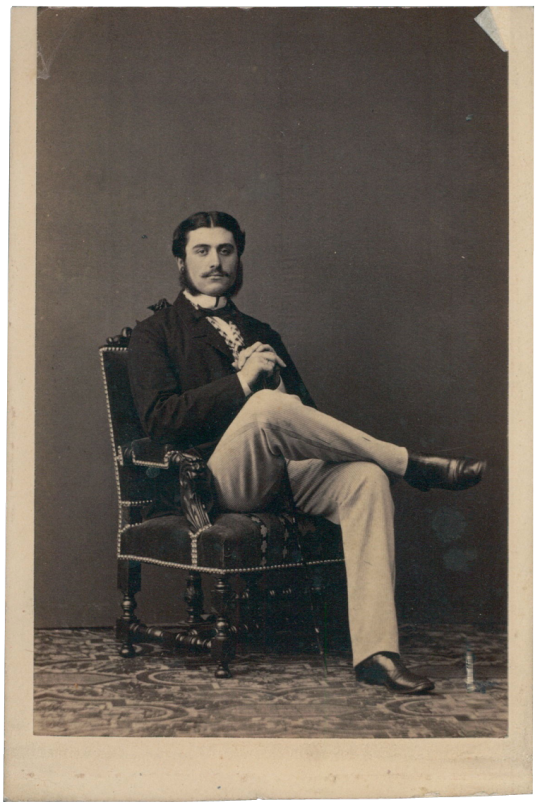
Carte de visite of a sleekly polished gentleman, backstamped Angers, France c. 1860s
#nowadays I try to follow an orderly file naming convention but this had been saved years ago as “caneslut.jpg” and you know what#I wasn’t wrong#19th century#1800s#1860s#19th century fashion#1860s fashion#fashion history#historical fashion#men's fashion#menswear#second empire#19th century photography#cdv#carte de visite#19th century men#vintage men
129 notes
·
View notes
Text
"[Elizabeth Woodville's] piety as queen seems to have been broadly conventional for a fifteenth-century royal, encompassing pilgrimages, membership of various fraternities, a particular devotion to her name saint, notable generosity to the Carthusians, and the foundation of a chantry at Westminster after her son was born there. ['On other occasions she supported planned religious foundations in London, […] made generous gifts to Eton College, and petitioned the pope to extend the circumstances in which indulgences could be acquired by observing the feast of the Visitation']. One possible indicator of a more personal, and more sophisticated, thread in her piety is a book of Hours of the Guardian Angel which Sutton and Visser-Fuchs have argued was commissioned for her, very possibly at her request."
-J.L. Laynesmith, "Elizabeth Woodville: The Knight's Widow", "Later Plantagenet and Wars of the Roses Consorts: Power, Influence, Dynasty"
#historicwomendaily#elizabeth woodville#my post#friendly reminder that there's nothing indicating that Elizabeth was exceptionally pious or that her piety was 'beyond purely conventional'#(something first claimed by Anne Crawford who simultaneously claimed that Elizabeth was 'grasping and totally lacking in scruple' so...)#EW's piety as queen may have stood out compared to former 15th century predecessors and definitely stood out compared to her husband#but her actions in themselves were not especially novel or 'beyond normal' and by themselves don't indicate unusual piety on her part#As Laynesmith's more recent research observes they seem to have been 'broadly conventional'#A conclusion arrived at Derek Neal as well who also points out that in general queens and elite noblewomen simply had wider means#of 'visible material expression of [their] personal devotion' - and also emphasizes how we should look at their wider circumstances#to understand their actions (eg: the death of Elizabeth's son George in 1479 as a motivating factor)#It's nice that we know a bit about Elizabeth's more personal piety - for eg she seems to have developed an attachment to Westminster Abbey#It's possible her (outward) piety increased across her queenship - she undertook most of her religious projects in later years#But again - none of them indicate the *level* of her piety (ie: they don't indicate that she was beyond conventionally pious)#By 1475 it seems that contemporaries identified Cecily Neville as the most personally devout from the Yorkist family#(though Elizabeth and even Cecily's sons were far greater patrons)#I think people also assume this because of her retirement to Westminster post 1485#which doesn't work because 1) we don't actually know when she retired? as Laynesmith says there is no actual evidence for the traditional#date of 12 February 1487#2) she had very secular reasons for retiring (grief over the death of her children? her lack of dower lands or estates which most other#widows had? her options were very limited; choosing to reside in the abbey is not particularly surprising. it's a massive and unneeded jump#to claim that it was motivated solely by piety (especially because it wasn't a complete 'retirement' in the way people assume it was)#I think historians have a habit of using her piety as a GOTCHA!' point against her vilification - which is a flawed and stupid argument#Elizabeth could be the most pious individual in the world and still be the pantomime villain Ricardians/Yorkists claim she was#They're not mutually exclusive; this line of thinking is useless#I think this also stems from the fact that we simply know very little about Elizabeth as an individual (ie: her hobbies/interests)#certainly far less than we do for other prominent women Margaret of Anjou; Elizabeth of York;; Cecily Neville or Margaret Beaufort#and I think rather than emphasizing that gap of knowledge her historians merely try to fill it up with 'she was pious!'#which is ... an incredibly lackluster take. I think it's better to just acknowledge that we don't know much about this historical figure#ie: I do wish that her piety and patronage was emphasized more yes. but it shouldn't flip too far to the other side either.
22 notes
·
View notes
Text

Interior of the former Carmelite convent in Paris
French vintage postcard
#tarjeta#postkaart#paris#sepia#historic#photo#postal#briefkaart#interior#photography#vintage#ephemera#ansichtskarte#carmelite#old#postcard#french#convent#postkarte#carte postale
17 notes
·
View notes
Text

Report of the Woman's Rights Convention
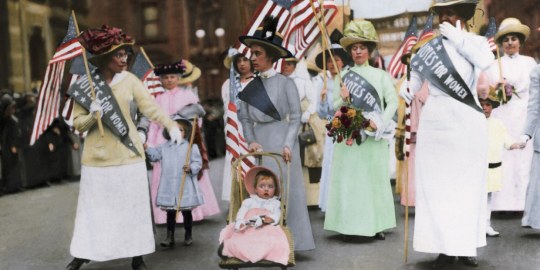
Colorized photograph of a Suffragists march

Whereas, the great precept of nature is conceded to be; "that man shall pursue his own true and substantial happiness." This law of Nature being coeval with mankind, and dictated by God himself, is of course superior in obligation to any other. It is binding over all the globe, in all countries, and at all times; no human laws are of any validity if contrary to this, and such of them as are valid, derive all their force, and all their validity, and all their authority, mediately and immediately, from this original; Therefore,
Resolved, That such laws as conflict, in any way, with the true and substantial happiness of woman, are contrary to the great precept of nature, and of no validity; for this is "superior in obligation to any other."
Resolved, That all laws which prevent woman from occupying such a station in society as her conscience shall dictate, or which place her in a position inferior to that of man, are contrary to the great precept of nature, and therefore of no force or authority.
Resolved, That woman is man's equal--was intended to be so by the Creator, and the highest good of the race demands that she should be recognized as such.
Resolved, Therefore, That, being invested by the Creator with the same capabilities, and the same consciousness of responsibility for their exercise, it is demonstrably the right and duty of woman, equally with man, to promote every righteous cause, by every righteous means; and especially in regard to the great subjects of morals and religion, it is self-evidently her right to participate with her brother in teaching them, both in private and in public, by writing and by speaking, by any instrumentalities proper to be used, and in any assemblies proper to be held; and this being a self-evident truth, growing out of the divinely implanted principles of human nature, any custom or authority adverse to it, whether modern or wearing the hoary sanction of antiquity, is to be regarded as self-evident falsehood, and at war with the interests of mankind.
[...]

Elizabeth Cady Stanton & two of her sons: Henry (left) and Daniel -1848

Declaration of Sentiments
When, in the course of human events, it becomes necessary for one portion of the family of man to assume among the people of the earth a position different from that which they have hitherto occupied, but one to which the laws of nature and of nature's God entitle them, a decent respect to the opinions of mankind requires that they should declare the causes that impel them to such a course.
You'll find the full text HERE
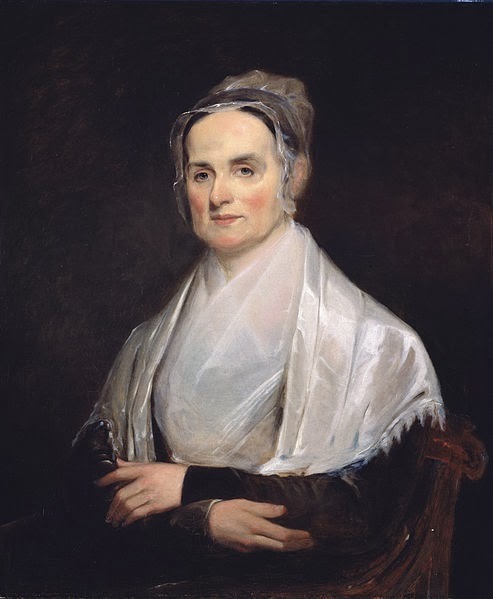
Portrait of Lucretia Mott
Before the convention, women’s rights were usually ignored publicly, but after, they were almost always in the papers. Yes, at first there was mostly ridicule, but as months passed, people began to start thinking more about how women were treated, and then at least some people agreed that women were treated very poorly and something needed to be done about it.

Suffragists marching in New York City 1915

"Nothing blocks human progress more effectively than religious bigotry." - Elizabeth Cady Stanton
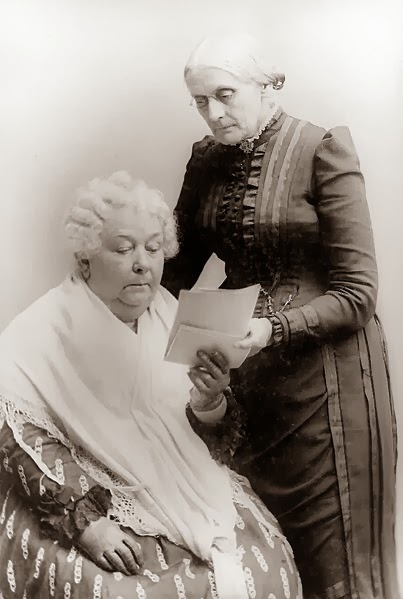
Elizabeth Cady Stanton and Susan B. Anthony in 1900
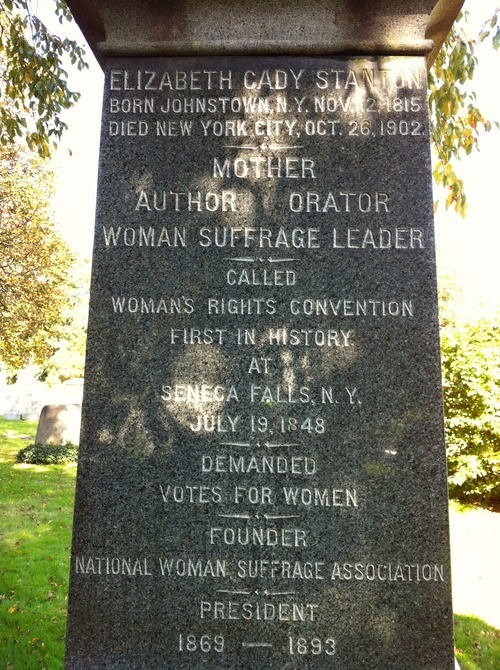
#human rights#women's rights#women's rights convention#declaration#babysitting#the Declaration of Sentiments#cliff clavin#Elizabeth Cady Stanton#Lucretia Mott#vintage photography#historical photos#susan b. anthony
37 notes
·
View notes
Text
not to be about opera again but to be about opera again. as an art form it has the reputation of being super stuffy and something for snobs who don't know how to have fun only but honestly this was one of, perhaps even THE main theatrical entertainment for centuries. i wish people knew how hard these things can go and how engaging they can be. like characters kill and die and fight wars and (almost) commit human sacrifice left and right. characters fall in love they mourn they're ecstatic they cry they're furious it's an extremely dramatic and emotional art form! and i understand that opera does not appear approachable bc of the general conventions of the art form but i promise old works can be fun and engaging if you go watch them with some preparation beforehand (reading the libretto helps) - not to mention not all operas are old bc there are so many modern operas which engage with topical events! also the music slaps.
#le triomphe de trajan (1807) out here calling for a man's execution with this banger:#point de grace pour ce perfide; que tout sons sang coule sur un autel#(no grace for this treacherous man; let all his blood flow on an altar)#this is also annoying to me when people write historical fic and the characters treat the opera as this elitist thing#that they don't know anything about.#you know when they go to the opera reluctantly and then they have no idea what's going on on stage or who the composer is.#which is. very unlikely for anyone with the money to attend an opera in certain opera houses in the 19th c. tbqh#like im more of an expert on paris and vienna idk what it was like in london#but if you were decently (upper) middle class or nobility (esp in paris) you went regularly. this was like a whole social space too#i recently read a fanfic and one of the characters was like 'oh it's in italian. i don't know that' and the other character went like#'it's by a man called donizetti what did you expect'#(this was situated in 19th century london)#like first of all. donizetti was NOT a librettist he was a composer he did not write the text#and second of all. he worked on french operas ?? so did rossini. and spontini.#opera was an incredibly international art form. also bc productions would be performed in different countries all the time#(sometimes changed and/or translated but not necessarily)#and again like i said. this was one of THE main forms of entertainment. people were familiar with its conventions! it was well-liked!#ofc bc of the seating prices it was not very accessible to lower classes most of the time#but lbr most characters that get written into an opera scene in fiction are at the very least decently bourgeois lol#i wish people knew how to properly historicise forms of entertainment whose reputation has changed in the modern era#from what it was a century or more ago#very adjacent to people 'cancelling' old lit bc of 'bad takes' like idk how to tell you this but people thought different back then#completely different world view from what we have today. that does not make lit from that era irredeemable it is just from a diff. time#acknowledging that and reading the text critically but also still enjoying it are things that go tgt here#ok rant over (it is never over)#curry rambles
10 notes
·
View notes
Text




Hey y’all! I’ll be at Animethon Edmonton Artist Alley table A102 this weekend, with these art prints as well as one of a kind sketchbooks, and also some of my new designs will be available as large tapestries 👀
26 notes
·
View notes
Text
The desire to order a hussar jacket off the internet and/or learn how to sew to make a high collared tailcoat that could be a marshal’s uniform to cosplay as a dead French general Grows
#cadmus rambles#I know how to handsew and I have access to a sewing machine but I think an actual full coat would need a Higher Sewing Skill#showing up to a convention as a dead historical guy that absolutely no one will recognise
15 notes
·
View notes
Photo

As an acquisitions librarian, I’ve always had access to a plethora of books. I’d go thru phases, and one of my most fascinating was the “nun phase.” I found it so interesting to read what it was like, and many times I was very surprised. So, come along with me today and explore this abandoned 200 yr. nunnery and former care house in the UK.

So, it’s got Gothic vibes.

I don’t know about you, but I wouldn’t be into a huge community living room.

I wonder if this was the refectory- what they call the dining room in a convent.

Nope.

I’m not a thief, but I think this would’ve gone home with me.

Wow, the rehab room looks like a torture chamber. We can thank Puddlebrigade for identifying everything- The torture chamber is actually the playing chamber for carillon bells. There is a second picture of the keys.


Of course, a nunnery has to have stained glass windows.

So, I think we’ve entered the church part.

Another device I don’t recognize. Puddlebrigade: That’s a stair lift without a seat on it

I would say that a statue stood here.
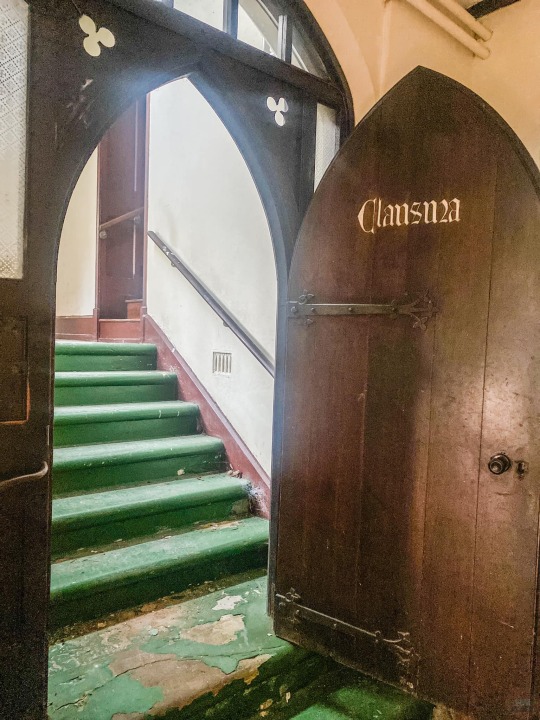
I searched this on Google Lens and it translates as “Closure.”

Corridor.

Wow, what is this? So then, these would be the keys for the carillon.

All the bathrooms seem to be single- inconvenient for a group home.

Cool architectural salvage piece.

I have no idea what that is. Puddlebrigade: That’s a manual hospital bed or gurney, you can see the foot pedal to lift the mattress.

This is nice.

The entrance in the dark.
via hidden midlands
#historic nunnery tour#abandoned nunnery UK#abandoned convent tour#abandoned convent/care facility UK#long post
158 notes
·
View notes
Text
“Hamilton.” - Dr. William Samuel Johnson, delegate from Connecticut, in his diary
Only twice during the year did Dr. William Samuel Johnson (CT) indicate in his diary what had occurred in the Congress or the Convention. Today he followed the routine notation “In Convention” with one word, “Hamilton.”
(source — National Historical Park Pennsylvania)
This was the date of Hamilton's six-hour speech at the Constitutional Convention. I think it's telling why he wrote such.
#amrev#american history#alexander hamilton#historical alexander hamilton#william samuel johnson#constitutional convention#history#cicero's history lessons
47 notes
·
View notes
Text

The Black Peoples’ Convention (BPC) – South Africa: Historical Background and Documents, Edited by Sipho Buthelezi, n.p., 1978 [Black Liberation Press, Harlem, NY, 1978] (pdf here) [Wits Historical Papers, DISA – Digital Innovation South Africa. Bibliomania, El Cerrito, CA]
#graphic design#pamphlet#cover#steve biko#stephen bantu biko#sipho buthelezi#black consciousness movement#bcm#black people's convention#bpc#black liberation press#wits historical papers#digital innovation south africa#1970s
10 notes
·
View notes
Text
future is an anchoress in the way an anchoress is a ghost . this is a very tumblr sentence. please accept it
#the real historically grounded role of the anchoress is also important to me but i am not above using things as metaphors and also typhon#is a convent send post
4 notes
·
View notes
Text
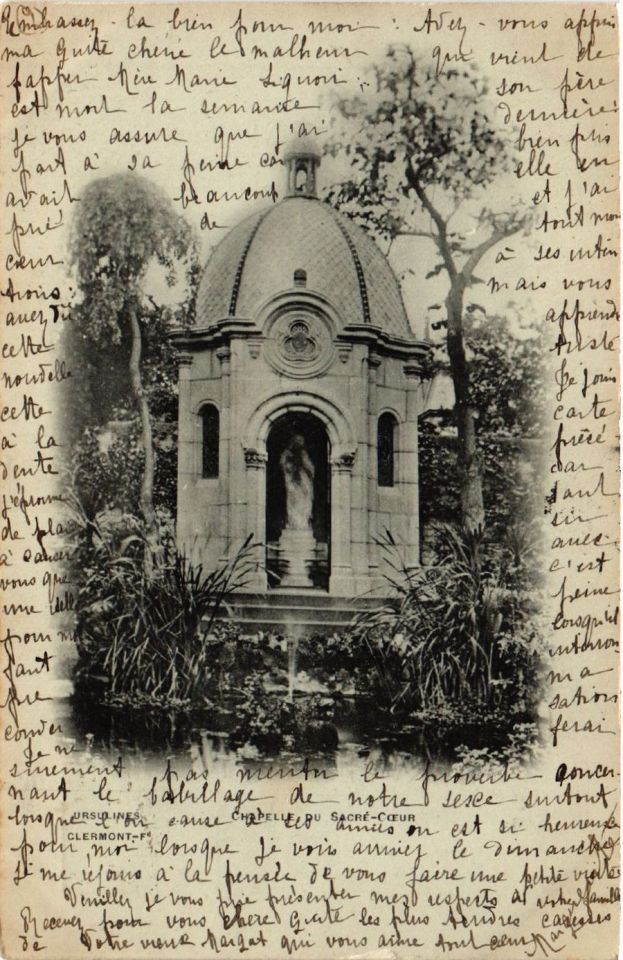
Chapel in the courtyard of the Ursuline Convent in Clermont-Ferrand, Auvergne region of central France
French vintage postcard
#historic#the ursuline convent#photo#briefkaart#vintage#region#convent#courtyard#sepia#ursuline#photography#clermont-ferrand#carte postale#central#postcard#auvergne#postkarte#france#postal#tarjeta#ansichtskarte#french#old#ephemera#postkaart#chapel#clermont#ferrand
22 notes
·
View notes
Text
Having the Aubrey-Maturin series be the first historical fiction I’ve ever read after a lifetime of sci-fi, fantasy and horror is such a wild experience. Possibly my favourite book series to date have been Discworld and the Hainish Cycle. So coming from that to this? It’s been insane, lads. I can’t quite explain it, either. I’m just gearing up for book three but holy shit. This has been insane, I can’t believe I didn’t read this earlier
I will say that the first A-M book completed the trifecta of Character Deaths That Affected Me Far Too Deeply.
#I’m not counting Sherlock Holmes or Agatha Christie novels as historical fiction even if they lack any fantastical elements#I never read a Jane Austen novel because the romance always put me off#is historical fiction actually really good and I just never noticed?!#also: there is something in the way O’Brian writes his characters that reminds me of Terry Pratchett#errr something something genre conventions and subversions#and we’ll leave it at that#yeah I didn’t expect (spoilers?) Dillon’s death to impact me so much I miss him#if I hadn’t been on public transport I would have begun to cry#god DAMN#I know absolutely nothing about the author btw#aubrey maturin#master and commander#aubreyad#actively putting off the last chapter of Post Captain coz I know I’ll plough through this series with zero restraint if I’m not stopped
42 notes
·
View notes
Text
i wonder sometimes why men are attracted to nuns......... by design they are not going to fuck you
#idk if those lesbian convent stories were true i only ever saw them on tumblr and in historical crime podcasts#txt
2 notes
·
View notes
Note
How do we know that COA was offered her daughter made bona fides and kept princess? When was this?
It was an offer made by Henry alongside Campeggio when he was there before the trial, that her acceptance of the offer meant the trial could be foregone ....
We (Wolsey and Campeggio) are agreed in opinion to test the mind of the Queen, and to persuade her to consent to the separation, and to enter the profession of some religion. For this purpose his Lordship promised me the assistance of himself and all the prelates of the kingdom, and the favor of the King, and that the Queen shall have any honorable conditions which she demands, retain her station as Queen*, and not lose anything except "l'uso della persona del Re," which he (Wolsey) says she has lost for many years; allowing her her dowry, rents, ornaments, and assignments for her support, and many other things; especially that the succession of the kingdom for the present shall be established in her daughter, by the ordinance and consent of all the estates, in case there should never be any legitimate male heir.
....(although, actually I don't exactly remember, that might have just been one stage of the offer...another might have been that her absence from the trial would ensure a result in Henry's favor; as we know she refused to attend after her speech and it did not, so whether or not that was true...Campeggio had a decretal comission to declare the marriage valid or invalid at Blackfriars and didn't, so in some sense they both got played, although Catherine only in hindsight...ironically, she would later vehemently complain about the severe injustice of the delay in any resolution, but she was the one that had interceded for that delay**, demanding the case only be tried in Rome). Even her counsel at the time, before becoming as contumacious as he did (Bishop Fisher), advised her to take this 'deal', as it were. Off the cuff, I don't remember every reference made to it, Chapuys some months later does also mention (very conditional) 'offers' made to her, but the dispatch is frustratingly vague:
Meanwhile the Queen is daily assailed by people making her all manner of offers, if she will only consent to the divorce; but she remains as firm as ever [...]
In 1533 Chapuys reports Catherine as having said she was willing to take the 'offer' made to her by the King's council three years ago, that then she had thought it was a feint to induce her to accept demotion, but she would accept it now. He does not specify what this offer was, I remember I went back to the sources of when Henry's council visited and argued with her and it was not clear then, either, but I always wondered if that was what she was alluding to. If so it was too late at that point; Henry had decided that the issue of any union that contravened divine law was irrevocably illegitimate (although technically, he would not manage to garner Parliamentary assent for this notion until three years later, he only managed it by implication in 1534), and he believed that was what it was.
Often apologia of Catherine's stance in the late 1520s has been, why should she have even considered that inducement, how was it even presented as an 'offer', even if the papacy had annulled the marriage, Mary would be bona fides regardless, etc. It was presented as an offer, inducement, compromise of sorts because in England that was not the legal precedent (ie, an offer made on behalf of her daughter that was not guaranteed otherwise):
"[Henry VIII] now argued she would would be barred by illegitimacy. This contention puzzled continental contemporaries because elsewhere in western Europe those children born to couples who in good faith believed themselves validly married were treated as legitimate. Nevertheless, Henry was right. After a period of some uncertainty, by the late fourteenth century England had opted out of the bona fides principle. As Sir John Baker notes, 'succession problems were usually debated in legal terms and in accordance with the common law canons of inheritance.' A successful challenge to his marriage would thus automatically bastardise Mary and leave Henry no direct heir... [although] Mary could have been legitimated by statute."
- JF Hadwin, The Journal of Ecclesiastical History
*One assumes this meant only a ceremonial title of some sort, ie Dowager Queen of England, as her sister-in-law was still referred to as Queen of France.
**Probably not anticipating resolution would not take place for another four years, but...still.
#anon#so...i think the answer has to be that catherine believed she would win#and she was vindicated although this was something of a pyrrhic victory for her own lifetime#and beyond it if we are considering 1536-52#or maybe she was not aware of this precedent which doesn't speak very highly of her advisors#her stans kind of want it both ways in a lot of aspects of the GM which is sort of like...#well either she was ignorant of certain things or knew them and decided to take the gamble#which presents a bit of an either/or with the Genius of the Tudor Court versus Devoted Mother Above All except for them it has to be both#the pragmatic solution would have been to put henry to oath with witnesses that mary would be first in succession after any sons#by subsequent marriage... in exchange for her agreement#to either enter convent (although as the article i quoted argues that wouldn't have really been an entire solution in and of itself) or#to tell charles v not to interfere and let the matter run its course in the courts#that is of course something of a secular perspective but isn't that the win win? if you win then great she's ahead of everyone#if you don't at least there's the chance for the throne#this was basically what did end up happening with the caveat that she was still illegitimate but at that point it had nothing to do w/ coa#more like in spite of her#royal retirement also /= an admission of sin; people seem to have really minimal historic literacy on this subject...#charles v retired to a monastery in 1556.#although traditionally it was for royal widows#(catherine of valois; eleanor of provence; elizabeth woodville...)#there might have been the crux of her moral opposition.#henry insisted she was arthur's widow; catherine insisted she was not
9 notes
·
View notes